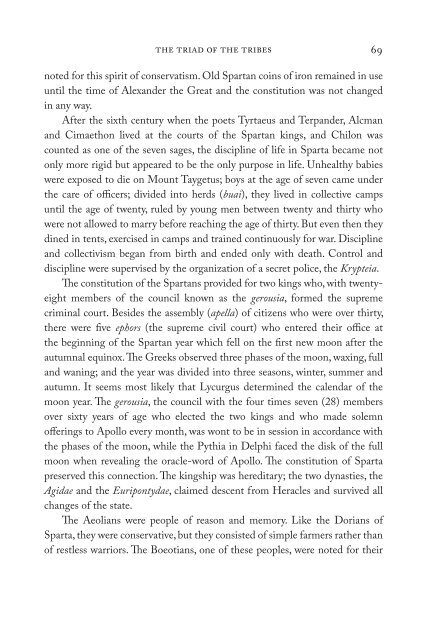The Gospel of Hellas - Research Institute for Waldorf Education
The Gospel of Hellas - Research Institute for Waldorf Education
The Gospel of Hellas - Research Institute for Waldorf Education
Create successful ePaper yourself
Turn your PDF publications into a flip-book with our unique Google optimized e-Paper software.
the triad <strong>of</strong> the tribes<br />
noted <strong>for</strong> this spirit <strong>of</strong> conservatism. Old Spartan coins <strong>of</strong> iron remained in use<br />
until the time <strong>of</strong> Alexander the Great and the constitution was not changed<br />
in any way.<br />
After the sixth century when the poets Tyrtaeus and Terpander, Alcman<br />
and Cimaethon lived at the courts <strong>of</strong> the Spartan kings, and Chilon was<br />
counted as one <strong>of</strong> the seven sages, the discipline <strong>of</strong> life in Sparta became not<br />
only more rigid but appeared to be the only purpose in life. unhealthy babies<br />
were exposed to die on Mount Taygetus; boys at the age <strong>of</strong> seven came under<br />
the care <strong>of</strong> <strong>of</strong>ficers; divided into herds (buai), they lived in collective camps<br />
until the age <strong>of</strong> twenty, ruled by young men between twenty and thirty who<br />
were not allowed to marry be<strong>for</strong>e reaching the age <strong>of</strong> thirty. But even then they<br />
dined in tents, exercised in camps and trained continuously <strong>for</strong> war. Discipline<br />
and collectivism began from birth and ended only with death. Control and<br />
discipline were supervised by the organization <strong>of</strong> a secret police, the Krypteia.<br />
<strong>The</strong> constitution <strong>of</strong> the Spartans provided <strong>for</strong> two kings who, with twenty-<br />
eight members <strong>of</strong> the council known as the gerousia, <strong>for</strong>med the supreme<br />
criminal court. Besides the assembly (apella) <strong>of</strong> citizens who were over thirty,<br />
there were five ephors (the supreme civil court) who entered their <strong>of</strong>fice at<br />
the beginning <strong>of</strong> the Spartan year which fell on the first new moon after the<br />
autumnal equinox. <strong>The</strong> Greeks observed three phases <strong>of</strong> the moon, waxing, full<br />
and waning; and the year was divided into three seasons, winter, summer and<br />
autumn. It seems most likely that Lycurgus determined the calendar <strong>of</strong> the<br />
moon year. <strong>The</strong> gerousia, the council with the four times seven (28) members<br />
over sixty years <strong>of</strong> age who elected the two kings and who made solemn<br />
<strong>of</strong>ferings to Apollo every month, was wont to be in session in accordance with<br />
the phases <strong>of</strong> the moon, while the Pythia in Delphi faced the disk <strong>of</strong> the full<br />
moon when revealing the oracle-word <strong>of</strong> Apollo. <strong>The</strong> constitution <strong>of</strong> Sparta<br />
preserved this connection. <strong>The</strong> kingship was hereditary; the two dynasties, the<br />
Agidae and the Euripontydae, claimed descent from Heracles and survived all<br />
changes <strong>of</strong> the state.<br />
<strong>The</strong> Aeolians were people <strong>of</strong> reason and memory. Like the Dorians <strong>of</strong><br />
Sparta, they were conservative, but they consisted <strong>of</strong> simple farmers rather than<br />
<strong>of</strong> restless warriors. <strong>The</strong> Boeotians, one <strong>of</strong> these peoples, were noted <strong>for</strong> their

















